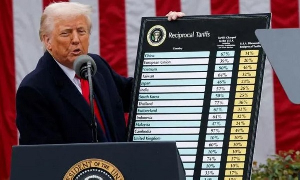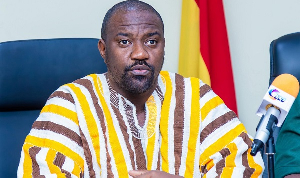Accra (Greater Accra), 22 Jan '99 - The government yesterday announced measures to revitalise the police service, boost morale and make it more responsive to the needs of the people. A white paper on the report of the seven-member Presidential Commission, which reviewed the structure and operations of the Police Service, noted that the service is woefully undermanned, and its personnel ill-trained and ill-equipped.
It also observed that morale and motivation among personnel are low and recommended measures to improve the situation. The government appointed the commission in 1996 under the chairmanship of Mr Justice Philip Archer, a former chief justice. It was to review the structure and operations of the Ghana Police Service and determine its response to the law enforcement needs of the nation. The White Paper on the report gives directives on all aspects of the service to improve its efficiency and to enable it to respond to current and future aspirations of the Ghanaian society.
Measures to improve the efficiency of the Service include the review of police guidelines and qualifications for enlistment, as well as the extension of the period of training of recruits from six to nine months. It also includes the review of outdated curricula to make a recruit, upon passing out, to see himself as an officer protecting the rights of individuals. ''Government also directs the refurbishment of the Police College as well as the establishment of a Staff College in addition to the Police College to provide training for senior police officers''. Senior police officers would, however, continue to participate in selected courses at the Ghana Armed Forces Staff College as part of the collaboration between the Police and the Ghana Armed Forces. The government has also directed the establishment of the position of deputy inspector-general of police and the decentralization of functions to give more responsibility to regional commanders in the areas of speedy disciplinary procedures, as well as promotion and inter-regional transfers.
The government directed that certain categories of functions within the Police Service could be performed by civilians in response to its severe manpower constraints. These are tailors, masons, draughtsmen, painters, plumbers and electricians. The others are electricians, carpenters, ward assistants, laboratory technicians, mortuary attendants, records personnel and dispensary assistants.. The government is of the view that the Service should disengage itself from bank duties, when private security organisations develop the capability to take over guard duties in terms of weapon handling. In the meantime, however, government has directed appropriate charges should be made by the police on the banks to cover all costs. The government has accepted the recommendation of the Commission that Metropolitan and District Assemblies should play a greater role in the performance of traffic duties and ''directs these authorities to recruit more people, where appropriate, to be trained by the Police''.
It further directs that the feeding, transportation and accommodation costs of Police personnel on operations in conflict areas should be borne by the Regional Co-ordinating Council of the affected region. The government has directed that where appropriate, new divisions should be created to enhance effective policing and ordered the creation of new divisions in the Ashanti, Central and the Tarkwa divisions. A second Police Crime Laboratory is to be opened in Kumasi to cater for the northern sector of the country. A formal training programme should be instituted to enable the young officers and other ranks to understudy the few experts to be trained both locally and abroad. The government has directed the establishment of a Marine Police Unit to ensure law and order at the country's two seaports and on the Volta Lake. It has directed that the headquarters of the proposed Forestry Service should be relocated to an appropriate place to make way for the expansion of the Police Hospital.
The Commission found that members of some police units are paid a percentage of their monthly salary as risk allowance, but when there is an emergency, all police personnel available, irrespective of the units they belong to, are mobilised. Those without such risk allowance do not benefit. The Commission also found the allowance for detective clothing paid to Police personnel to be so inadequate as to be insulting to the personnel concerned. ''The Government's White Paper gives specific directives as to how these and other areas, which undermine morale and the efficient discharge of duties of police personnel, including manpower requirements, logistics and uniforms, should be rectified''.
General News of Friday, 22 January 1999
Source: --












